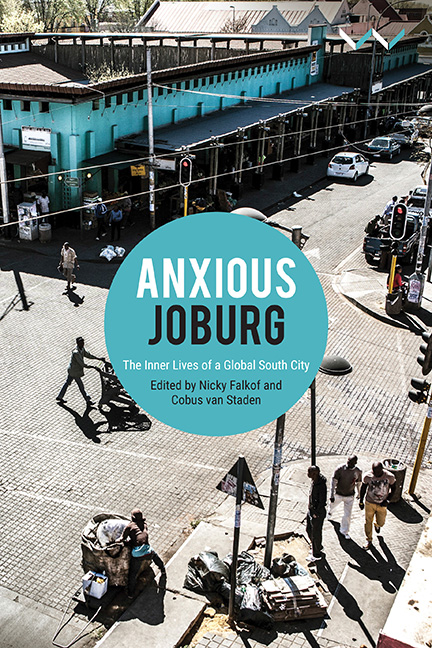Book contents
Afterword: Urban Atmospheres
Published online by Cambridge University Press: 16 June 2021
Summary
Anxious Joburg is a timely and tantalising book. It contributes significantly to the growing literature on global south city lives and city forms. Analyses of these lives and forms have undergone salient shifts in recent times. The first shift has rendered newly vivid those aspects of the urban social that have long been treated as background: its infrastructural forms, in their violence as well as their sensory dimensions, and their capacities for drawing out the capillaries of the political, of the past and of corporeal life in the city in firmer and more graspable outline. The second shift has focused on the reconfiguration of urban landscapes according to material and biospheric processes under conditions of the Anthropocene. The third shift has emphasised cities as works of imagination, structures of affect and producers of atmosphere. Anxious Joburg carries inflections of each, while being compellingly located within this third shift in particular.
Johannesburg, along with Lagos and Kinshasa, is arguably Africa's most widely interpreted urban formation, capable of challenging key tenets of contemporary urban theory in ways that are definitive. This narratively dense African city now weaves its accounts of itself from the multiple intersecting anxieties that inflect its lives and forms. Crime is one of these potent strands; another is the tension identified by the editors between a ‘striated’ urban landscape that blocks flows and movement but which at the same time offers accelerated forms of mobility and chance encounter if and where you can make it through. So it is that the tension between ‘the need for something else and the constant reimposition of the same’ connects the disparate anxieties that the book tries to put its finger on.
Anxious Joburg takes the measure of its topic while escalating its condition, writing multiple anxieties into form. Reasons to feel anxious in Johannesburg are ‘ubiquitous rather than intermittent’, Falkof and Van Staden argue. A city's affective existence – its urban atmospheres, as I will suggest – are shaped and amplified by its physical geographies. Here is a city whose volatile social formations in their productive and destructive dimensions draw it closer to other African cities, even as it pulls away from them in its racial complexity and along its historically specific vectors of accumulation and exclusion.
- Type
- Chapter
- Information
- Anxious JoburgThe Inner Lives of a Global South City, pp. 267 - 274Publisher: Wits University PressPrint publication year: 2020



